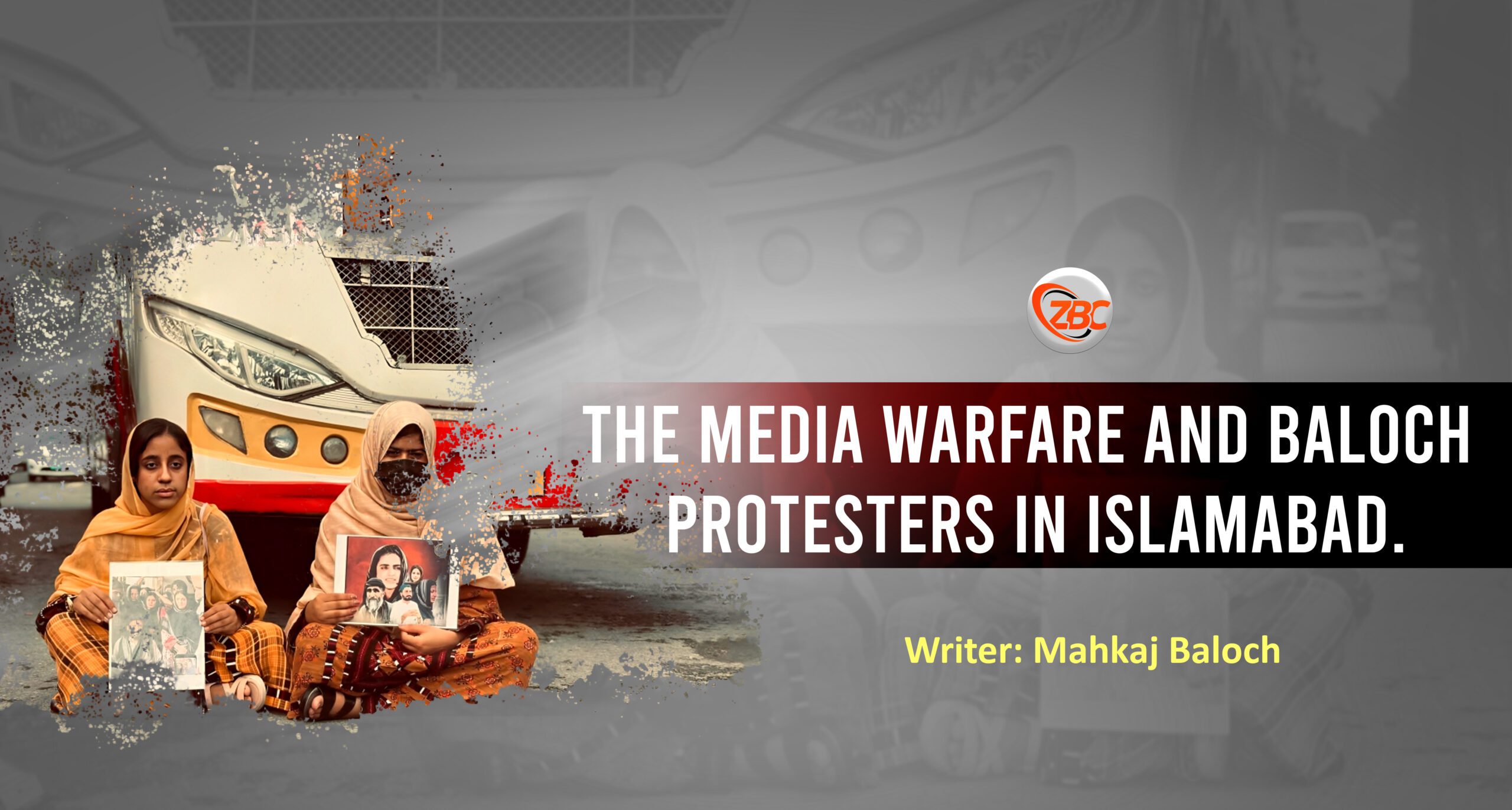
Writer: Mahkaj Baloch
The rain fell harder and harder in the green-city of Pakistan- the Islamabad. The entire city was rejoicing the rain, calling it a blessing. They went out on picnics, parks and to other amusing locations. The city was pouring them with the rain of fun, laughter and enjoyment. It was raining hard and hard. Five friends, likely Punjabis, when they had gathered to move out and enjoy the rain after hours of boredom sitting idly at home, faced police-stop near the National Press Club (NPC). Before they could ask the police why they were barred, they witnessed some elder mothers, infant girls, youth (boys and girls) – all wearing Balochi clothes – sitting and discussing with the capital-city police who had guns, sticks and were dealing with them inhumanely. All of the Baloch were wet with rainwater. Without umbrellas. With tents held by aged women and police barring them from fixing them.
The five friends, without being hesitant, turned back and took on the alternate route which took them only five minutes to get back to their track from the backside of the NPC.
For around a week, Baloch families of the detained Baloch Yakjehti Committee leaders and other illegally detained Baloch have organized a protest camp outside Islamabad’s National Press Club (NPC) where they are facing Pakistani federal city-administration brutes. When they reached there, they were hindered on the way for organizing their PC: then the speaker-owner was threatened to take away his speakers which he did, and yet the families presented their PC without speaker; then they were forced to leave when they had earlier announced of a camp outside the press club – that too without blocking any way for the public use – but they faced police force; when they did not listen to the administration, police denied them to fix their tents; it was raining. Yet they continued their protest and sat out on rain.
After 3 days, they were denied access to the press club where they had earlier organized their sit-in. The next day, police did not allow them to the NPC area blocking all the ways leading to the PC. And then, lastly, they were left to sit in the flowing rainwater. When the administration and their masters could not shake the courage and righteousness of the people, they threatened their flat-owner and got him evacuate the flats of the families at the midnight. But it could not work out either. Despite looking all the state brute directly, the entire Islamabad city, other regions of the colonial Pakistan, and the warlord-Baloch parliamentarians are tacit to the witnessing state atrocities on Baloch. This is the relationship of Balochistan with Pakistan. This is the relationship of the oppressors with the oppressed.
What is even more concerning is the media diversion and narratives, which the state’s 4th pillar, the media, is spreading through its lenses. For instance, the recent Dagari incident is, no doubt, a grave concern where two human lives were lost (by the hands of a local tribal chief, empowered by the state’s security agencies). The incident basically took place before Eid, but was surfaced when the Baloch protesters were being harassed continuously in Islamabad, fake encounters were increasing in Balochistan, enforced disappearances were exceeding across the Baloch regions and the other anti-Baloch policies were reshaping themselves. The entire people, being largely trapped by a media stunt, ignored all the other events, and took on one to the lead – which I never say should not be. But what is the larger concern, it is about taking up to the media one issue (the fate of which is very clear) to a level where all the other important and key issues are down and dusted. And secondly, it is about dishonoring Baloch and Balochistan with such an act and then making it collectively a Baloch psyche and code of Baloch life which it is not.
We have seen the whole pseudo-intellectuals coming forth as giants of change for the “unfair and brutal Baloch” with one act, including the participation of mainstream Pakistani media, in giving it full-coverage, calling it a collective societal mindset. With such a giant media hype with Pakistanis at top, it should have been clear that this is nothing more than a degrading-stunt, while hundreds of such cases are regularly reported from Punjab and other Pakistani regions. In fact, the present existing immoral mindset is the outcome of Pakistan’s occupation of the Baloch land. And it all emerged so high when we had the state forces targeting Baloch protesters in Islamabad and strengthening their extrajudicial murders and disappearances in Balochistan.
Media is a complex matter. We need to understand these complexities because we are facing a war of narratives as well. Under this, the state builds such narratives which will influence the ongoing movement for emancipation by confusing our narratives and acts. We need to understand the order of news, narratives and debates – that is how we can make fruitful impacts on existing Baloch national struggle.

